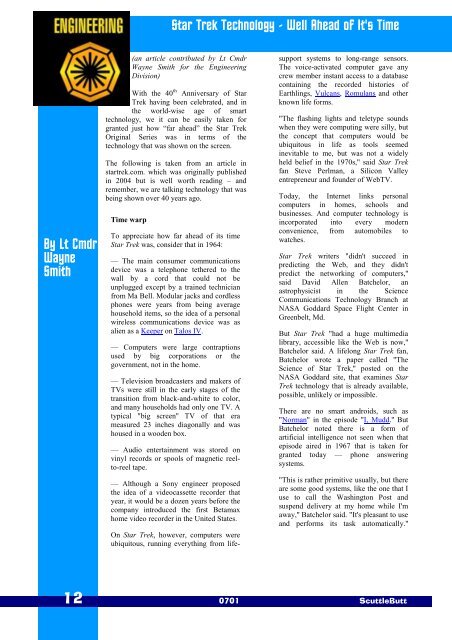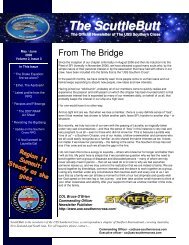ScuttleButt - USS Southern Cross
ScuttleButt - USS Southern Cross
ScuttleButt - USS Southern Cross
Create successful ePaper yourself
Turn your PDF publications into a flip-book with our unique Google optimized e-Paper software.
Star Trek Technology - Well Ahead of It's Time<br />
By Lt Cmdr<br />
Wayne<br />
Smith<br />
(an article contributed by Lt Cmdr<br />
Wayne Smith for the Engineering<br />
Division)<br />
With the 40 th Anniversary of Star<br />
Trek having been celebrated, and in<br />
the world-wise age of smart<br />
technology, we it can be easily taken for<br />
granted just how “far ahead” the Star Trek<br />
Original Series was in terms of the<br />
technology that was shown on the screen.<br />
The following is taken from an article in<br />
startrek.com. which was originally published<br />
in 2004 but is well worth reading – and<br />
remember, we are talking technology that was<br />
being shown over 40 years ago.<br />
Time warp<br />
To appreciate how far ahead of its time<br />
Star Trek was, consider that in 1964:<br />
— The main consumer communications<br />
device was a telephone tethered to the<br />
wall by a cord that could not be<br />
unplugged except by a trained technician<br />
from Ma Bell. Modular jacks and cordless<br />
phones were years from being average<br />
household items, so the idea of a personal<br />
wireless communications device was as<br />
alien as a Keeper on Talos IV.<br />
— Computers were large contraptions<br />
used by big corporations or the<br />
government, not in the home.<br />
— Television broadcasters and makers of<br />
TVs were still in the early stages of the<br />
transition from black-and-white to color,<br />
and many households had only one TV. A<br />
typical "big screen'' TV of that era<br />
measured 23 inches diagonally and was<br />
housed in a wooden box.<br />
— Audio entertainment was stored on<br />
vinyl records or spools of magnetic reelto-reel<br />
tape.<br />
— Although a Sony engineer proposed<br />
the idea of a videocassette recorder that<br />
year, it would be a dozen years before the<br />
company introduced the first Betamax<br />
home video recorder in the United States.<br />
On Star Trek, however, computers were<br />
ubiquitous, running everything from lifesupport<br />
systems to long-range sensors.<br />
The voice-activated computer gave any<br />
crew member instant access to a database<br />
containing the recorded histories of<br />
Earthlings, Vulcans, Romulans and other<br />
known life forms.<br />
"The flashing lights and teletype sounds<br />
when they were computing were silly, but<br />
the concept that computers would be<br />
ubiquitous in life as tools seemed<br />
inevitable to me, but was not a widely<br />
held belief in the 1970s,'' said Star Trek<br />
fan Steve Perlman, a Silicon Valley<br />
entrepreneur and founder of WebTV.<br />
Today, the Internet links personal<br />
computers in homes, schools and<br />
businesses. And computer technology is<br />
incorporated into every modern<br />
convenience, from automobiles to<br />
watches.<br />
Star Trek writers "didn't succeed in<br />
predicting the Web, and they didn't<br />
predict the networking of computers,''<br />
said David Allen Batchelor, an<br />
astrophysicist in the Science<br />
Communications Technology Branch at<br />
NASA Goddard Space Flight Center in<br />
Greenbelt, Md.<br />
But Star Trek "had a huge multimedia<br />
library, accessible like the Web is now,''<br />
Batchelor said. A lifelong Star Trek fan,<br />
Batchelor wrote a paper called "The<br />
Science of Star Trek,'' posted on the<br />
NASA Goddard site, that examines Star<br />
Trek technology that is already available,<br />
possible, unlikely or impossible.<br />
There are no smart androids, such as<br />
"Norman" in the episode "I, Mudd.'' But<br />
Batchelor noted there is a form of<br />
artificial intelligence not seen when that<br />
episode aired in 1967 that is taken for<br />
granted today — phone answering<br />
systems.<br />
"This is rather primitive usually, but there<br />
are some good systems, like the one that I<br />
use to call the Washington Post and<br />
suspend delivery at my home while I'm<br />
away,'' Batchelor said. "It's pleasant to use<br />
and performs its task automatically.''<br />
12 0701 <strong>ScuttleButt</strong>





